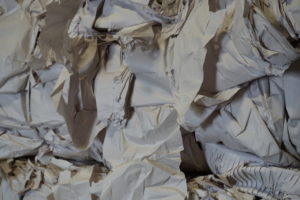China’s ban on paper, plastics and other items has the potential to impact not only the recycling industry, but also manufacturers, municipalities, and many other related industries.
Obviously, the elimination of mixed paper will generate a massive oversupply of material on the market. Recycling is, and always will be, a supply and demand controlled market, so this will drive down market pricing, as recyclers scramble to look for a market at any price.
Moving this material at no value or negative numbers (selling to companies that charge a fee to take this material rather than pay for it) may become the norm. Remember, being charged a nominal fee is better than paying a disposal fee to “dump” this material at a disposal site.
If this does become the norm, how will this fee be passed on to the generators, such as businesses and municipalities? Remember – if there is a charge to move this material to the end market, added on this charge would be the cost to pickup, transport, bale or process, plus a nominal profit. If these costs aren’t covered then the material won’t be recycled, it will become landfill.
What will happen to other grades that China does not choose to ban, but determines is a viable commodity worthy of recycling in their country? Will Chinese mills be required to pay more for these grades, as many of China’s businesses that bought mixed paper are now forced to buy other material to stay in business?? Do they have the option of cost effectively switch to other grades,  or will they be forced to close their doors? How long would this change take?
or will they be forced to close their doors? How long would this change take?
Much of the material that China bans or no longer imports will be dumped on any viable markets within the recycling industry. Markets are and have been in good balance, with capacity meeting supply in the past 5-7 years. But what will happen if supply exceeds capacity, by as much as 2-3 million tons? Mills, which never used mixed paper in the past, may begin using it in an attempt to significantly lower their raw material cost. This could displace other higher valued grades of paper they are now buying.
It’s also possible that other countries could begin taking this material, replacing the industry that China will be turning away from. Keep in mind that mills that consume this volume of material are massive, which takes extensive planning, permitting, engineering, and construction. Replacing these industries and creating demand for this material would take a number of years, at substantial cost. What would happen to this mixed paper during this time?
As mentioned in our previous article, there is much speculation within the industry as to the potential impact to this ban. Only time will tell how it all actually plays out.
Read up on other articles on this topic:
Repercussions on Recyclables from China’s “National Sword 2017” Policy

